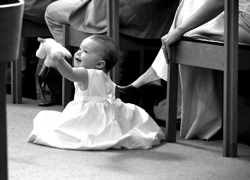This evening listened to the BBC's Director General Mark Thompson addressing the
Churches' Media Conference at Hayes Conference Centre in Derbyshire.

This is probably breaking news since I doubt if anyone will have published anything yet - so here you are, a hot report.
At the risk of taking his points out of context here are my notes from his talk - not complete but what I took to be the main points. He began by expressing hope in spite of complaints from some quarters. Like Desmond Tutu he is a,
"prisoner of hope"
________________________________
Religion and broadcasting are a lot more than the category we call religious broadcasting. Religion pops up all over the schedules, for example in Monastery. Religion is front and centre stage - dynamic, complex and always potentially explosive. The BBC was founded on the belief that broadcasting could be a transformational force for good; a force for enlightenment, enrichment. I am full of confidence and hope that it can be.
I want to look at the complex and pervasive pessimism about popular culture which contaminates so much of what is said and talked about broadcasting. Most complaints are determined to connect a particular fault to what they think is a deeper trend - dumbing down, falling quality, denigration of traditional values or plain old depravity. They see this decline as applying to the rest of cultural life - the BBC of which is a litmus. I see this as a trench system with one set of arguments ranged against and behind another.
Stupidity of contemporary culture?First trench - the stupidity of contemporary culture and broadcasting. They compare The Ascent of Man with Celebrity Wrestling.
In Steve Johnson's new book, Everything Bad is Good for You, he says that far from a decline into stupidity the main movement in popular culture in recent decades has been towards greater sophistication and cognitive challenge. He compares current output like The Sopranos and The Simpsons with their equivalents thirty years ago. What he finds is that there is more layering, more complexity, greater not lesser demands placed on viewers. The same with feature films and video games. The same trends are visible in this country as well. Compare the plotting, the characterisation, the wit, the cultural references of our new Dr Who with the linear simplicity of the old one. (Mark goes on to list some of big commissions in history and other factual programming which demonstrate the range and depth of current output).
When people look back they forget that American programming formed the spine of our output - Kojack, Man called Ironside etc. Yes, Kenneth Clarke's Civilisation was there, but so too was an alarming amount of Demis Rousos!
Cultural leveling?Next comes the more sophisticated charge of cultural leveling. Once there was a clear national culture and a hierarchy of excellence with a canon of great work at the top - Shakespeare, Dickens. Now all that's been thrown in the skip and we're all expected to bow down and worship Tracy Emin and Victoria Beckham.
The accusation is that we are spreading a destructive and subversive alternative. I think the BBC has done more to correct the balance and introduce more of that classical canon (Beethoven week on Radio Three). The unfashionable canon is playing a big part in the BBC's output. Is our culture exchanging some breadth for depth? I think it is possible that it is. Broadcasting has seen a multiplication of perspectives - women, ethnic minorities, marginalised. Even so traditional and mainstream voices should still be proudly on display.
Moral bankruptcy?The last and most serious trench in the system is around moral bankruptcy. Contemporary and popular culture (and broadcasting) are amoral or produce a system of morality which is different to and hostile to traditional moral perspectives. There is a great deal of amoral and hedonistic material out there. If the charge is that broadcasting is no longer a moral gatekeeper I think what's probably true, but don't make the mistake of believing that all TV is equally amoral. Much of our output (examples given) is presented within a moral framework. (Mentions Tsunami coverage, Live Aid etc.)
It depends on what your moral yardstick is. If it is swearwords and sex and not much more, then yes, things probably have slipped both on the screen and in society. But is you define moral and social concern more broadly then things look rather different - whether it's Africa or Iraq - broadcasting has become very interested in moral questions.
FinallyThere is a danger in this digital revolution...
Quoting Wordsworth, "
the great national events which are daily taking place, and the increasing accumulation of men in cities, where the uniformity of their occupations produces a craving for extraordinary incident which the rapid communication of intelligence hourly gratifies."Wordsworth imagines a kind of negative feedback loop where the craving and the growing speed of transmission of information leads to a kind of cultural scrambling. In his words,
"blunting the discriminating powers of the mind". Amazing for the 1800s.
Too much information delivered too quickly will, in the end, drive everyone mad. The city we are building now is virtual. The city is in our heads and it is open 24 hours a day.
It won't be possible for public service broadcasting to exist in this environment unless it cuts through and connects.
With on demand technology quality output can achieve a permanence because it does not only exist in a single point in time. Navigation and sign-posting become key.
The really big events will become bigger not smaller.
Creative integrity and conviction will become all the more important. The exceptional can stand out more and for far longer than ever before and the half hearted will disappear without trace.
________________________________






